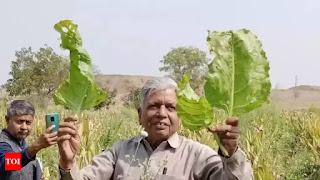A symbol of resilience and innovation, Sharma's life and work stand as a testament to the power of sustainable agriculture, demonstrating how harmony with nature can lead to both ecological and economic well-being.
In a region where despair often overshadows hope, Sharma has been a beacon of change. For decades, he advocated sustainable farming practices, emphasising three core principles he believes are crucial for the future of Indian agriculture: symbiosis with nature, harmony with all living organisms, and independence from market forces.
Sharma's journey took a pivotal turn in 1994 when he decided to abandon chemical farming after his crop yields began to plummet. In the following years, he turned to natural farming methods, and by 2000, his efforts bore fruit — his farm's output soared from 50 tonnes to 400 tonnes, all while drastically reducing the input costs. His belief that chemical farming is destructive, while natural farming is creative, is reflected in his results. "Natural farming is a way of restoring balance," he says. "It's about nurturing the land, not exploiting it."
His farm, situated near Darwha in Yavatmal, has become a learning hub for farmers seeking to embrace organic and natural farming practices. Sharma, whose farm is a living example of sustainable agriculture, teaches that a successful farmer must do four things: rear cattle, plant trees, facilitate the movement of birds, and make optimal use of biomass.
Sharma's philosophy goes beyond farming techniques; it's a call to look at the root causes of farmer distress. Speaking on the issue of farmer suicides, he urges a shift in perspective. "Think beyond farmer suicide. Understand why a farmer commits suicide," he says.
"Instead of just sympathising with him, empathise with him. Give a farmer the right price for his produce. If we don't, he will end up working as a labourer at a construction site in your city. What do you value more — a house or food?," he adds.
In his 70s, Sharma continues to work tirelessly on his farm until late in the evening. His dedication to his land and his community is unwavering, and it was while returning from his farm that he first learned of his Padma Shri recognition. "Earth, water, indigenous seeds, crop planning, and labour are the five principles of natural farming. The govt must recognise the importance of natural farming and create policies accordingly. Given the future challenges in agriculture, farmers must shift towards natural farming," he says.
Sharma's message is simple but profound: for the future of agriculture, we must turn to nature, not away from it.
"This Content Sponsored by Buymote Shopping app
BuyMote E-Shopping Application is One of the Online Shopping App
Now Available on Play Store & App Store (Buymote E-Shopping)
Click Below Link and Install Application: https://buymote.shop/links/0f5993744a9213079a6b53e8
Sponsor Content: #buymote #buymoteeshopping #buymoteonline #buymoteshopping #buymoteapplication"





No comments:
Post a Comment